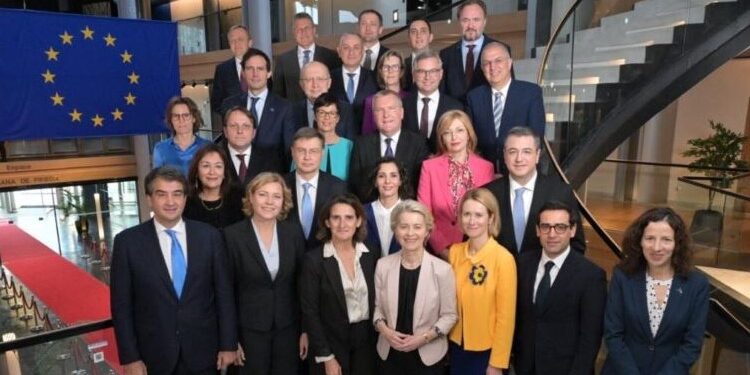Ane Barcos
The European Parliament approved the Von der Leyen Commission II on Wednesday with 370 votes in favour, 282 against and 36 abstentions.
After a hearing process marked by cross-vetoes driven by partisan interests, the European Parliament gave its support this Wednesday, in a tight vote, to the new Commission of Ursula von der Leyen. This new Executive will have the 26 commissioners initially appointed, a scenario that has not been repeated for two decades.
The former third vice-president of the Spanish Government, Teresa Ribera, will serve as executive vice-president for the Clean, Fair and Competitive Transition and Commissioner for Competition in the new European Commission of Ursula von der Leyen, after the leaders of the three main parliamentary groups, Manfred Weber (EPP), Iratxe García (S&D) and Valérie Hayer (RE), reached an agreement last week that will allow the new Community Executive to come into force on 1 December.
To reach this agreement, the EPP agreed to lift the veto on Teresa Ribera, which was pushed last time by the leader of the PP, Alberto Núñez Feijóo, in protest against her handling of the DANA crisis. In return, the Social Democrats did the same with the far-right Raffaele Fitto, the candidate of the Italian Prime Minister, Giorgia Meloni.
The Von der Leyen II Commission will get underway this Sunday, December 1, 2024, after obtaining the support of the European Parliament on Tuesday with 370 votes in favor, 282 against and 36 abstentions.
The debate prior to the vote maintained the dynamics established by the political groups during the confirmation hearings of the candidates. The refusal of the Spanish delegation of the European People’s Party stood out, which tried to pressure its group to overturn the candidacy of the socialist Teresa Ribera, questioning her management of the DANA. This blockage triggered a domino effect that paralysed the approval of other key candidates, including vice-presidencies.
The deadlock was resolved thanks to an agreement between the traditional pro-European majority in Parliament, made up of the Popular Party, Socialists and Liberals. The pact included the support of the EPP for Ribera in exchange for the support of the Socialists for the candidates of the Italian government of Giorgia Meloni, Raffaele Fitto, and of the Hungarian Viktor Orbán, Viktor Várhelyi.
However, the Spanish Popular Party voted against the Commission, as a sign of its rejection of Ribera, whom they accused of arriving in Europe with “too many unfinished business” after his management in Spain.
Among the 282 votes against, the extreme right was also included, especially the Patriots for Europe group, which strongly attacked the outgoing and incoming Commission. Its leader, Jordan Bardella, accused Von der Leyen of allying herself with the left, saying that these policies would lead “Europe to the abyss”. The Spanish MEP from Vox, Jorge Buxadé, regretted that Ribera had not been rejected earlier and described the new Executive as “the mud commission”, attributing responsibility for this situation to Parliament.
Criticism also arose from the other side of the hemicycle. Both the Greens/EFA and the Left denounced the presence of figures linked to the extreme right, such as Fitto, and expressed concern about the policies of austerity, migration and alliances with ultra-conservative parties.
The Left group, led by Manon Aubry, strongly opposed the new Commission, considering it a clear step backwards for progressive and pro-European values.
The Social Democrats and Liberals were less critical, offering majority support to the new community team. However, the leader of the S&D group, Iratxe García, recalled that the support is not a “blank cheque” and stressed the importance of maintaining the commitment to social justice and the fight against climate change. The Spanish delegation valued the agreement reached between the pro-European forces.
Renew Europe, for its part, which also supported the new College of Commissioners, welcomed the fact that some of its demands, such as limiting the powers of Hungarian Commissioner Várhelyi on reproductive rights, were met. Its leader, Valérie Hayer, advocated unity, stressing that the vote should not be interpreted as a political battle.
Although the approval of the Commission represents a victory for Von der Leyen, it is marked by deep internal divisions that show the political tensions that could define the legislature.
Sánchez and Albares congratulate Ribera
The President of the Government, Pedro Sánchez, and the Minister of Foreign Affairs, José Manuel Albares, have congratulated the current third vice-president of the Government on Wednesday for the confirmation of her appointment for the new European Commission of Ursula von der Leyen.
“We already have the new European Commission in place,” Sánchez declared through social networks. “Europe wins. Spain wins,” he continued. “Congratulations, Teresa Ribera, first vice-president of the European Commission with an impressive and unprecedented portfolio: direct power over competition policy and coordination in energy and climate policy,” he added. “Congratulations, Ursula von der Leyen,” he concluded.
The appointment of the new Commission was discussed this Wednesday in the Congress of Deputies, during the session of control of the Government, in which the deputy Macarena Montesinos, of the PP, stated that, “only because of Ribera’s responsibility and his disastrous management” in the DANA crisis, “he does not deserve to be part of the European Commission”. She also criticised the fact that the Government has ended up giving its vote to the candidates of the extreme right in the new Executive of Ursula von der Leyen after having been “abhorring” them.
In his response, the Minister of Foreign Affairs, José Manuel Albares, stated that “there is nothing dirtier” than having voted against the new European Commission, as the PP has done in the European Parliament, to defend its partisan interests above those of Europe. “Unprecedented”, he proclaimed.
According to the minister, with this attitude, the PP has “turned its back on Europe” at a turbulent time, with the war in Ukraine and the advance of the extreme right. He also said that “the appointment of Teresa Ribera as First Executive Vice-President of the European Commission, who joins many others, including Nadia Calviño as President of the EIB, demonstrates the growing weight and reliability that Spain and its current policies offer in the EU and in the world.”







